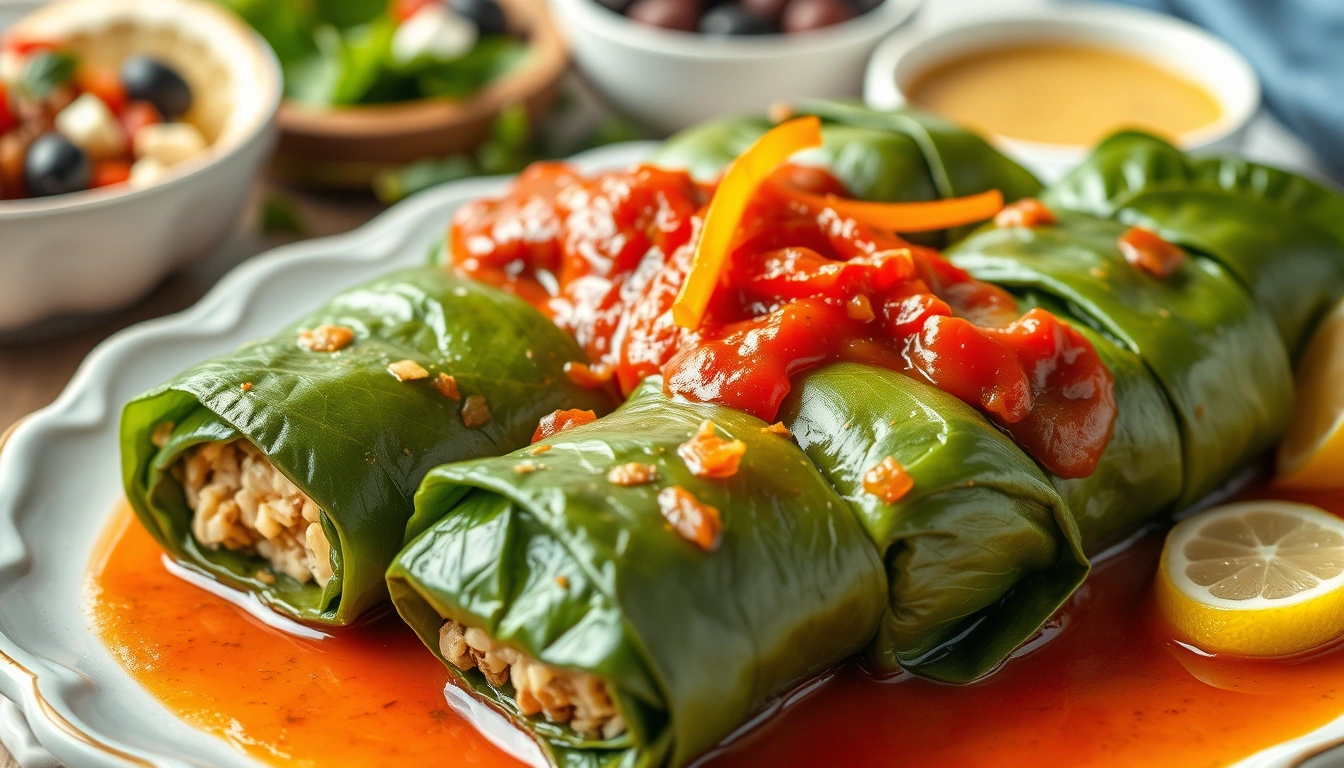History and Origin of Dolmades
Dolmades are a traditional dish from Mediterranean and Middle Eastern cuisine, with roots dating back thousands of years. Their name comes from the Turkish word "dolma," which means "stuffed" or "wrapped." Essentially, dolmades consist of green leaves wrapped around a filling that typically contains rice, meat, and spices. In different Latin American countries, although the term "dolmades" is not so common, similar dishes are known as "stuffed leaves" or simply "leaf tamalitos."
In Greece, Turkey, Lebanon, and other neighboring countries, dolmades are an important part of the culinary culture, especially during holidays and family gatherings. They are traditionally prepared with grape leaves, but there are variants that use chard, cabbage, or even corn leaves. The recipe we use here with Swiss chard is a delicious adaptation that provides a fresh flavor and a soft texture, ideal for those looking to try a different twist on this classic.
How to Prepare Swiss Chard Dolmades
Swiss chard dolmades are a wonderful option to enjoy a dish full of flavor and tradition, with a filling that combines unique ingredients and a delicious aroma. Here you will learn how to prepare them step by step to impress at the table.
Ingredients: Swiss chard leaves, white rice, garlic, butter, sliced almonds, white raisins, curry powder, salt, lamb shoulder, olive oil, dried dill.
Steps to prepare the dolmades:
Sauté rice or orzo along with garlic in butter for one minute, then add the almonds.
Stir the mixture only until the almonds brown slightly to get that crunchy touch.
Turn off the heat and gently incorporate the remaining ingredients to maintain the texture.
Brown the lamb shoulder and garlic in olive oil; when the lamb is browned, add the rice and stir only until the rice begins to take on color.
Turn off the heat and incorporate the remaining ingredients, mixing well to integrate the flavors.
Prepare 3 cups of canned tomato juice and have the lemon wedges ready along with both fillings to use in the next step.
In a 9x11 inch baking dish or in a large, wide stewing pot, pour 3/4 cup of tomato juice or enough to cover the bottom with about 1/2 inch of depth.
Rinse the Swiss chard leaves and cut off any thick stems that might make folding difficult.
Stack the Swiss chard leaves in a steamer basket or a metal colander placed over a pot of boiling water and cover to steam them.
Let the leaves steam for 3 to 4 minutes, until they are soft and flexible but still bright green.
After 2 minutes, use two spatulas to flip the entire pile of leaves and allow the less cooked leaves to cook more evenly.
Carefully remove the Swiss chard leaves and place them on a plate to cool and become easier to handle.
Flatten a leaf on the work surface and place approximately 2 tablespoons of the chosen filling 1/2 inch above the stem end.
Fold each side of the leaf over the filling and then roll from the stem end, burrito-style, finishing with the top folded over the roll to ensure it is well sealed.
Place each dolma seam side down so they do not open during cooking.
Differentiate the vegetarian dolmades from the meat ones by placing a thin strip of carrot or red bell pepper on the vegetarian ones.
Repeat the process with all the leaves and available filling.
If any leaf is torn or there is leftover filling, sprinkle it into the tomato juice in the dish to add extra flavor to the sauce during baking.
Pour the remaining tomato juice over the dolmades to keep them moist and give them a delicious flavor.
You have two methods to cook the dolmades: bake in a moderate oven at 350 degrees Fahrenheit for 35 minutes on the top rack uncovered, or simmer them in a large stew pot on the stovetop.
If you choose the pot, press the dolmades by placing a plate on top and then something heavy on the plate so they compact while cooking.
Cook over low-medium heat for 20 to 25 minutes.
This method produces a more compact dolma that holds together better when serving.
It is important that, when taking the dolmades out of the oven or turning off the stove, you let them rest for at least 10 minutes so they settle and are less likely to fall apart.
Serve four dolmades per person accompanied with lemon wedges to squeeze on top to taste.
These dolmades are also delicious if enjoyed cold or at room temperature.
As suggested side dishes, you can prepare avgolemono soup, a mixed salad with black olives and feta cheese, fresh steamed artichokes, or garlic bread to complement this unique culinary experience.
